Key takeaways:
- Collaboration and adaptability are crucial for success in the social innovation marketplace, facilitating transformative solutions to societal challenges.
- Workshops enhance learning through immersive experiences, fostering diverse perspectives and critical thinking, while also encouraging networking and lasting relationships.
- Key themes in social innovation include community empowerment, cross-sector collaboration, and leveraging technology for social good.
- Personal growth from workshops involves stepping out of comfort zones, embracing vulnerability, and engaging in meaningful self-reflection after each session.
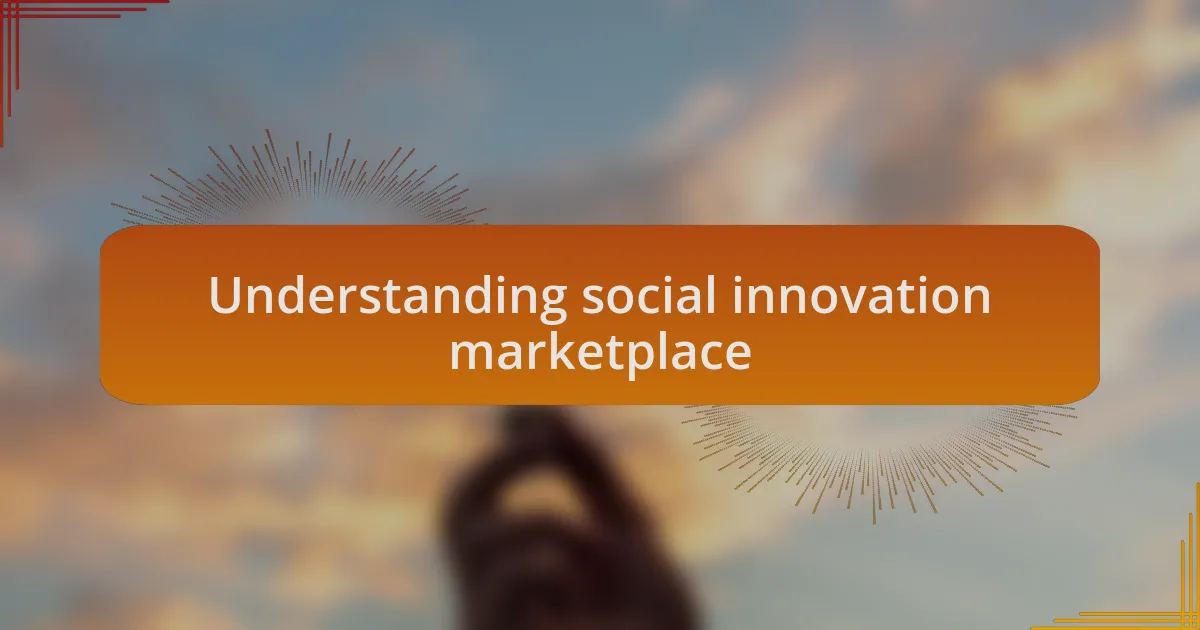
Understanding social innovation marketplace
The social innovation marketplace is a dynamic space where ideas and solutions converge to address pressing societal challenges. I remember attending a workshop where participants brainstormed solutions for food insecurity. It was inspiring to see diverse minds collaborating and how that synergy can spark real change in communities.
Understanding this marketplace also means recognizing its potential to transform traditional approaches to problem-solving. Have you ever wondered why some initiatives succeed while others fizzle out? From my experience, success often hinges on collaboration and the ability to adapt ideas to fit local contexts. Without that flexibility, even the best concepts can struggle to take root.
At its core, the social innovation marketplace is about fostering relationships and connections. Sharing stories, like the one from that workshop, can often reveal the hidden gems of knowledge we all carry. It’s a reminder that within each of us lies the potential to contribute uniquely to social change, if we only open ourselves to the conversation.
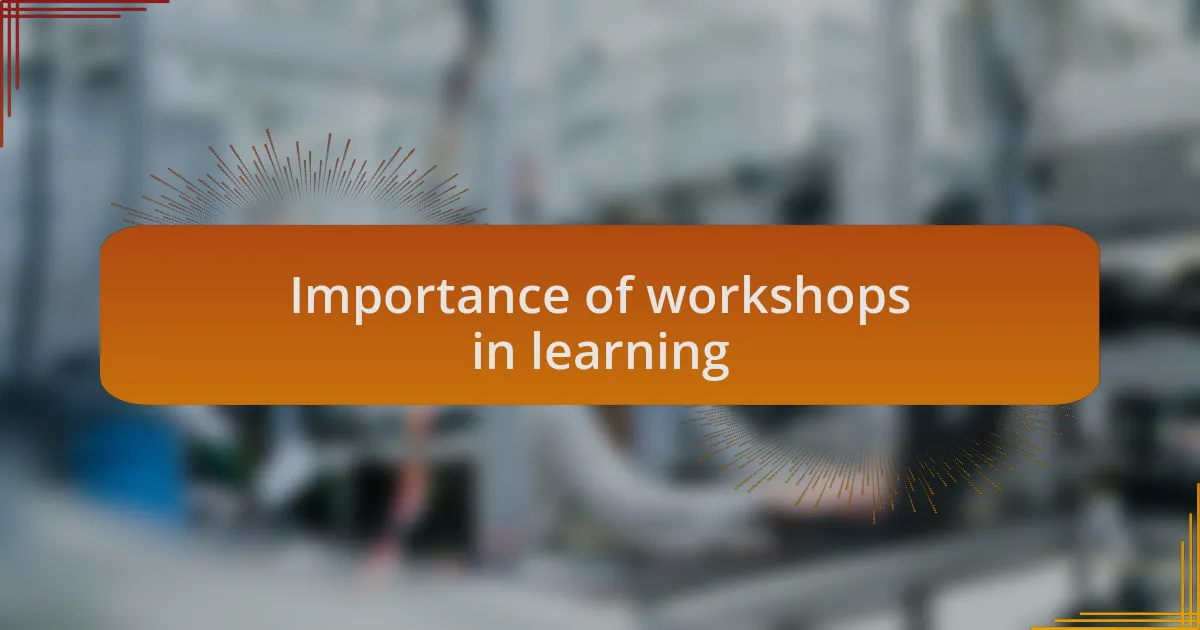
Importance of workshops in learning
Workshops are vital in the learning process as they create immersive environments where participants can actively engage with the material. During one workshop on disaster response strategies, I vividly recall how role-playing scenarios brought theoretical concepts to life. It wasn’t just about listening; we were confronted with challenges that forced us to think critically and creatively on our feet. Doesn’t it feel empowering to tackle real issues in real-time?
Every workshop fosters a unique space for diverse perspectives, enriching the learning experience. I once attended a session on community development, where storytellers shared their lived experiences. Their narratives not only deepened my understanding but also instilled a sense of duty to apply what I learned in meaningful ways. Have you ever considered how much knowledge is hidden in the stories of others, just waiting for the right context to emerge?
Moreover, the collaborative nature of workshops encourages networking and building lasting relationships. I remember leaving a workshop with newfound connections—individuals who shared my passion for social innovation. Those bonds became invaluable as we continued to support each other’s projects and ideas. Isn’t it fascinating how a few hours spent together can lay the groundwork for future collaborations that might change our communities?
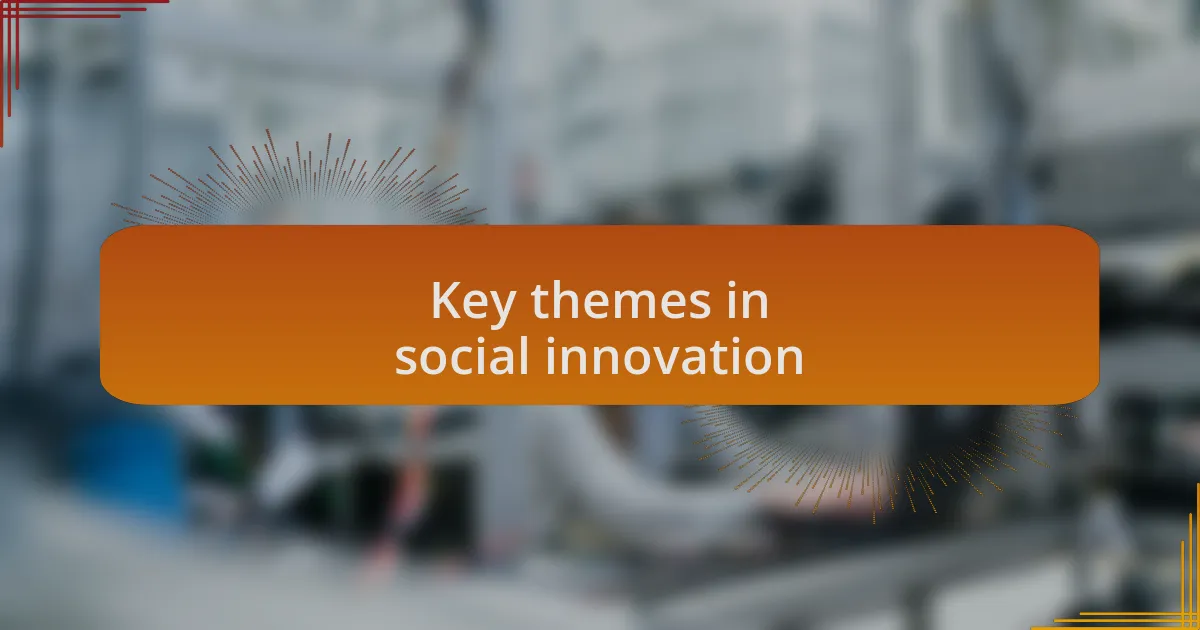
Key themes in social innovation
Key themes in social innovation often center around community engagement and empowerment. I recall a workshop focused on grassroots movements that really opened my eyes. The stories shared by community leaders highlighted not just the challenges they faced but also the incredible resilience and creativity that arose from those struggles. How often do we underestimate the power of local voices in driving change?
Another theme that resonated with me is the importance of collaboration across sectors. During a session on public-private partnerships, I was struck by a project where a nonprofit and a local business united to provide job training for at-risk youth. This fusion of expertise and resources demonstrated how diverse stakeholders can create sustainable solutions. Have you ever thought about how bridging gaps between different sectors can unlock new opportunities?
Lastly, the role of innovation in driving social change cannot be overlooked. I participated in a workshop that showcased tech-driven solutions for environmental issues. The enthusiasm in the room was palpable as participants brainstormed ways to harness technology for social good. It made me wonder—what untapped potential lies in our current challenges, waiting for innovative minds to transform them into opportunities?
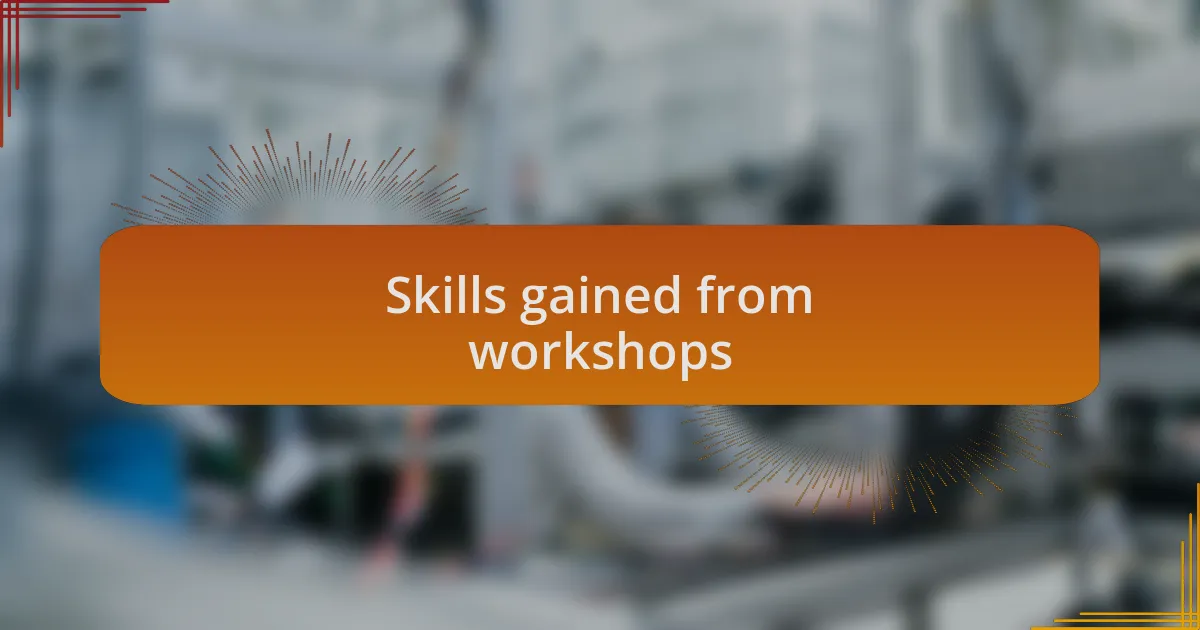
Skills gained from workshops
The skills I gained from workshops have been invaluable, particularly in enhancing my communication abilities. I still remember a session that emphasized storytelling as a powerful tool for social impact. By sharing personal experiences, I learned how to convey complex issues in relatable ways. Have you ever noticed how a well-told story can inspire action and foster deeper connections?
Collaboration was another key skill I developed. In one workshop, we engaged in role-playing exercises where we had to work in diverse teams to solve hypothetical challenges. This experience taught me to appreciate different perspectives, prompting me to ask myself: how can we leverage our collective strengths to tackle real-world problems? I found that being open to others’ ideas often led to more innovative solutions than I could have imagined alone.
Critical thinking also emerged as a standout skill during my workshop experiences. I recall a particular session focused on evaluating social enterprise models, where we analyzed various case studies. The discussions challenged me to think beyond surface-level solutions and consider the broader implications of our decisions. This introspection made me realize how vital it is to question assumptions and think critically in our ever-changing world. Have you ever paused to reflect on how thoughtful analysis can reshape our approach to challenges?
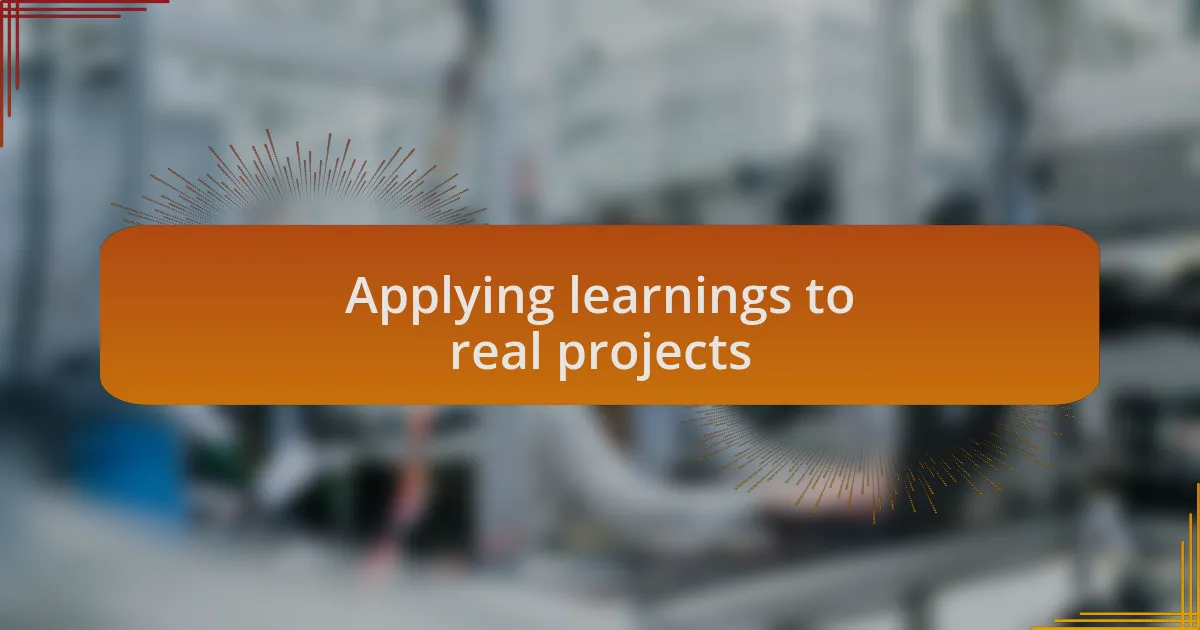
Applying learnings to real projects
One of the most rewarding aspects of applying my learnings from workshops is the way I’ve been able to implement storytelling techniques in live projects. I recall a project focused on local youth empowerment where I crafted narratives around personal testimonials. This approach not only engaged the audience but also brought a human face to the data we were presenting. Have you ever felt a story resonate so deeply that it shifted your perspective on an issue? That’s the kind of connection I strive for in every project.
I’ve also discovered that collaboration doesn’t just happen in workshops; it thrives when you carry those skills into real-world scenarios. In a recent initiative aimed at addressing food insecurity, I brought together members from various community organizations. Drawing on my experience from role-playing exercises, I facilitated discussions that encouraged openness and creativity. Seeing the diverse ideas flow from our brainstorming sessions reminded me how invaluable those varied perspectives can be. Have you ever felt like a project truly came alive when everyone contributed their unique insights?
Critical thinking has transformed the way I evaluate ongoing projects. In one instance, while assessing the impact statistics of a community program, I utilized the analytical techniques I learned in workshops to question the effectiveness of methodologies we were using. This led to a pivotal discussion on refining our metrics, ultimately enhancing our outreach efforts. It made me realize that questioning the status quo isn’t just a skill; it’s a necessary mindset for anyone passionate about driving social change. How can we expect to innovate if we don’t dare to challenge our assumptions?
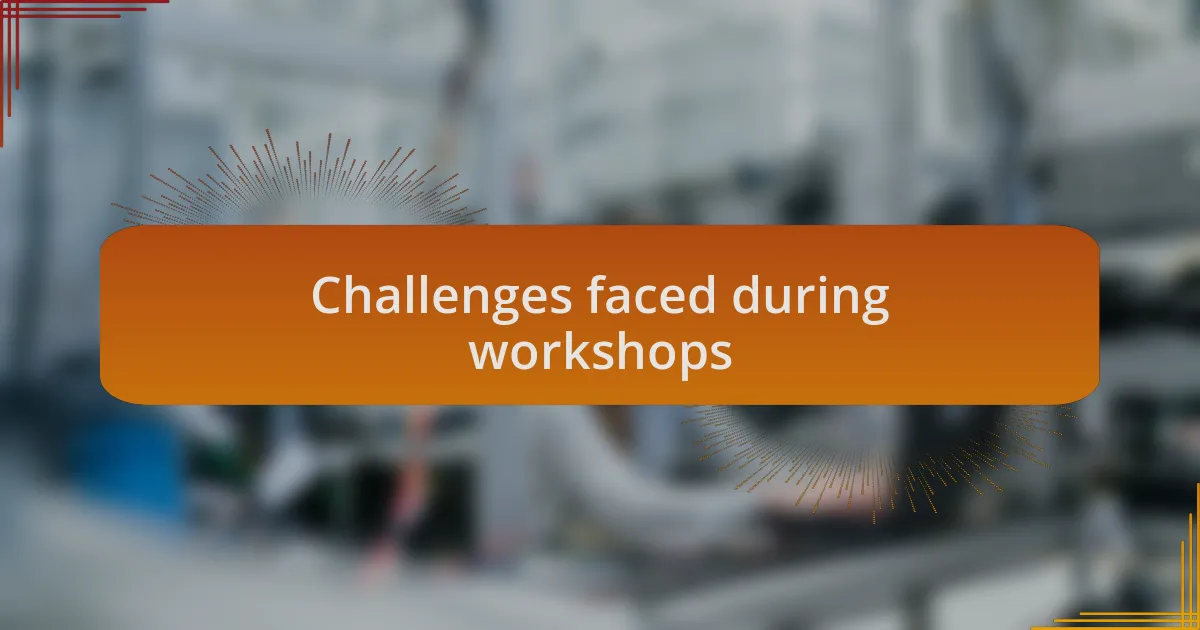
Challenges faced during workshops
One significant challenge I often faced during workshops was the varying levels of engagement among participants. For instance, in a recent session dedicated to community organizing, I noticed that while some participants were eager to share ideas, others seemed hesitant. This disparity can create an uneven dynamic that disrupts the flow of discussion. Have you ever tried to pull the best ideas out of a group where some voices are much louder than others? It made me realize that fostering an inclusive environment is not just beneficial; it’s essential.
Another hurdle came with managing the diverse expectations participants had going into workshops. During one particular workshop on social entrepreneurship, I encountered individuals who were looking for step-by-step guidance while others demanded open-ended brainstorming sessions. Striking the right balance between structure and flexibility proved challenging. I often found myself wondering: how do we make everyone feel satisfied without sacrificing the workshop’s overall effectiveness? Navigating these varied desires takes both patience and creativity.
Lastly, time constraints can severely limit the depth of discussions and the exploration of topics. In a workshop focused on sustainable practices, I vividly recall racing against the clock, which led to superficial exchanges rather than in-depth analysis. This urgency often left me feeling unsatisfied, as I knew there was much more to uncover. Have you experienced that nagging sense of wanting to delve deeper, only to be cut short? It prompted me to think critically about how to optimize our schedule for better engagement and richer conversations.
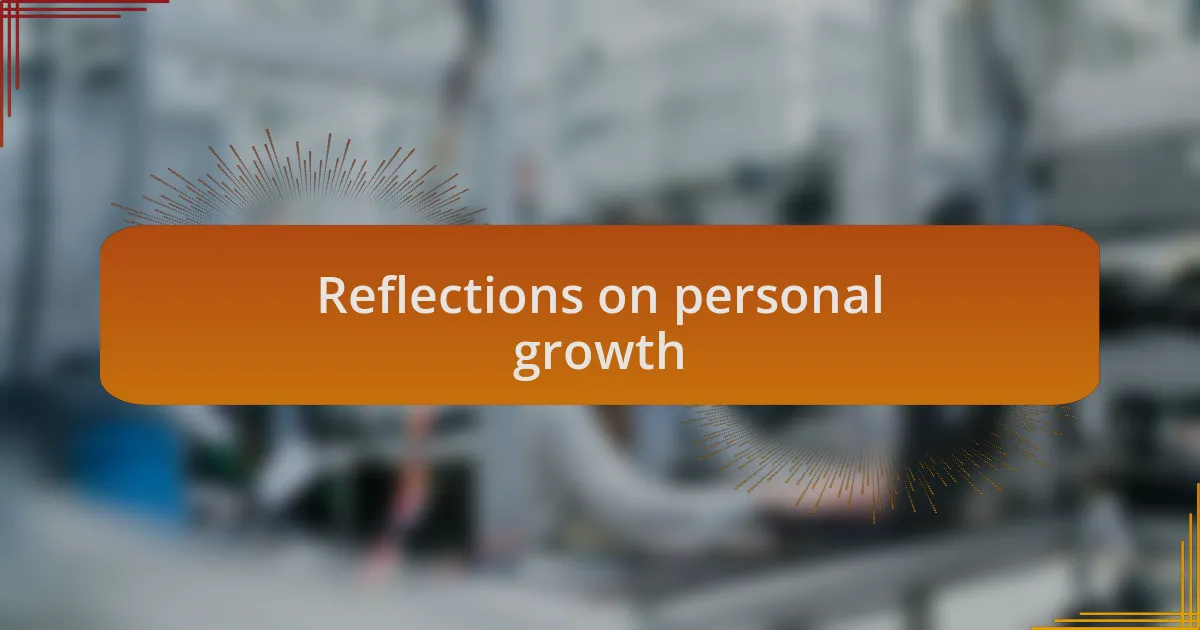
Reflections on personal growth
Reflecting on my personal growth through these workshops, I’ve come to appreciate how stepping out of my comfort zone has been a powerful catalyst for transformation. I still remember my first workshop, where I felt completely overwhelmed. But as I pushed myself to engage more, I discovered not just my voice but also the strength in vulnerability. It’s like a light bulb went off; the more I shared, the more I learned from others in return.
As I navigated various sessions, I began to recognize my patterns of learning and collaboration. I used to shy away from group activities, worried about how my ideas would be received. Yet, there was a moment during a brainstorming session that struck me: when I took the initiative to share an unconventional concept, it sparked a lively discussion that I hadn’t anticipated. Have you ever had a moment when you realized your contributions could change the course of a conversation? That experience not only boosted my confidence but also deepened my understanding of collaborative growth in diverse environments.
Over time, these workshops have also taught me the importance of self-reflection. After each session, I find myself pondering what I could have done differently and how I can apply these lessons moving forward. One evening, after a particularly impactful workshop, I scribbled down my thoughts on what made me feel connected to the group. That process made me realize that growth isn’t a linear journey; it’s filled with twists, turns, and the occasional backtrack. Have you ever reflected on your experiences and uncovered unexpected insights? These moments have become pivotal in shaping my approach to future collaborative efforts.